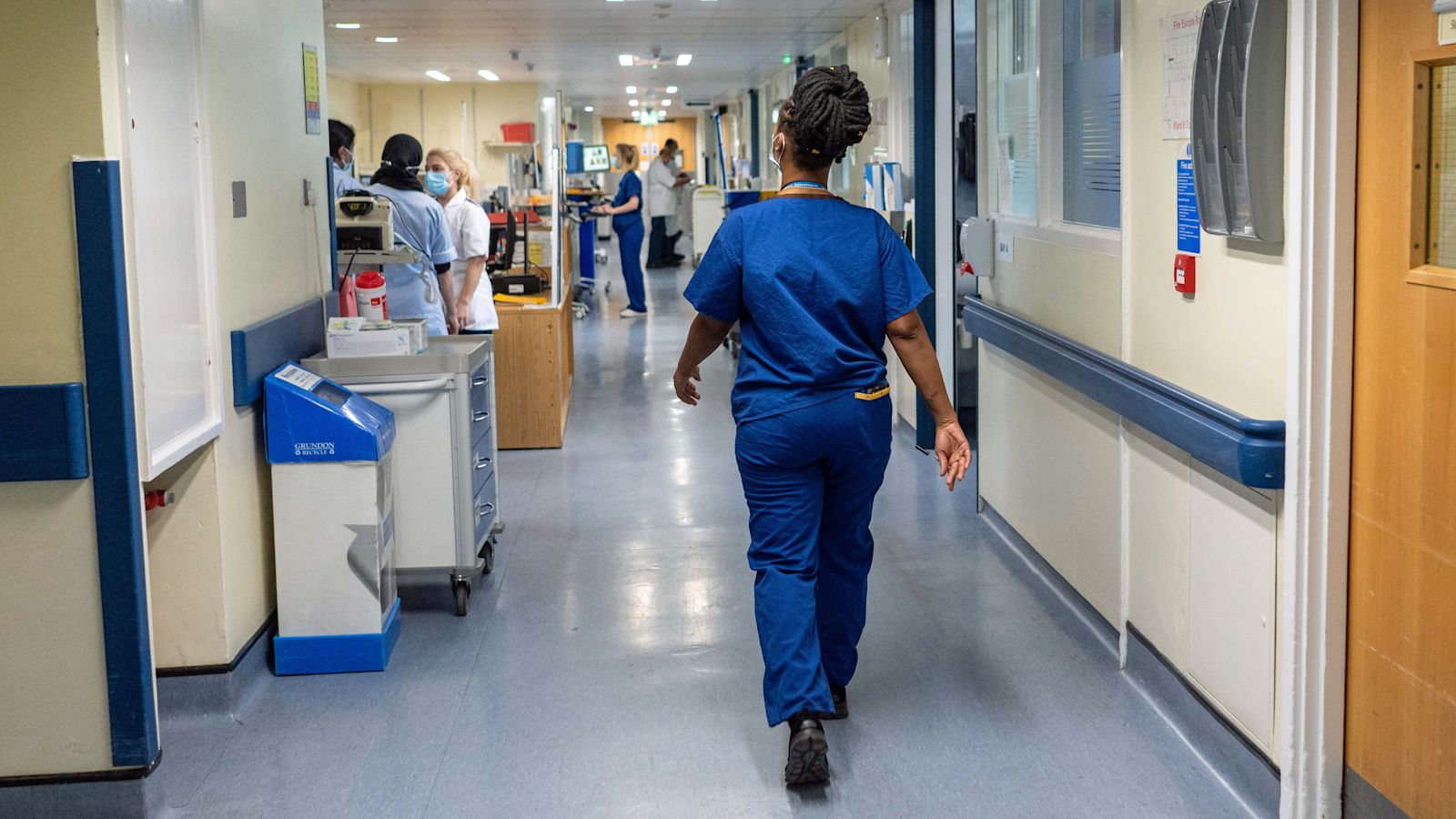Cowper’s Cut 323: “Efficiency our motto, by which we proudly stand”

The future isn’t what it used to be
NEW: NHS spending has risen more slowly than planned at the last election despite the pandemic and record waiting lists.
— Institute for Fiscal Studies (@TheIFS) May 14, 2024
Read George Stoye, @MaxWarnerIFS & @benzaranko’s Election 2024 report on UK health spending, funded by @finan_fairness @NuffieldFound: https://t.co/NulxDnA11f
The past and future of UK health spending, a new Institute for Fiscal Studies report by George Stoye, Max Warner and Ben Zaranko, shows how Conservative And Unionist Party plans at the 2019 general election implied that the day-to-day health budget in England would rise by 3.3% per year in real (inflation-adjusted) terms over this parliament.
The Government’s latest plans imply average growth of 2.7% per year, with additional cash funding for the health service more than offset by higher inflation.
As the authors note, “despite a pandemic, record waiting lists and growing rates of ill health, real-terms health spending has risen less quickly than was planned five years ago. This breaks the habit of a lifetime: over the past 40 years, the NHS budget has almost always grown more quickly than originally planned. This parliament is the exception.
“Health spending has grown more slowly than originally planned, and more slowly than the long-run average, but because economic growth has been so feeble, health spending as a share of GDP has grown more quickly than usual … The latest plans imply no real-terms growth for the NHS England budget between 2023–24 and 2024–25. There are currently no published plans for health spending beyond that point.
“Whoever takes office after the next election won’t have long to decide budgets for the NHS and other government departments for the next fiscal year (2025–26). Given the well-documented pressures on the NHS, holding spending flat in real terms is unlikely to be a sustainable long-term strategy.
“If we disregard the recent years when exceptional pandemic funding was withdrawn, the last time that the health budget failed to grow for two consecutive years was in the 1950s. The NHS England Workforce Plan – endorsed by both main UK parties – implies a real-terms funding growth of around 3.6% per year if it is to be achieved. That is a more realistic benchmark.”
They add that “the DHSC’s day-to-day budget has risen dramatically from a 26% share of the all-departmental total in 1998–99 to 43% in 2022–23 … Capital spending has long been much more volatile than day-to-day health spending.
“After being cut back sharply in the 2010s, capital spending has increased in recent years – though in 2023–24, the capital budget in England was raided to fund day-to-day pressures, returning to the bad practice of the late 2010s.
“One consequence of low capital spending is the deterioration of the NHS estate in England, where the maintenance backlog has more than doubled over the past decade. Within that, the ‘high-risk’ backlog has quintupled.”
Voters claim to be willing to pay more for NHS improvement

New deliberative research from Ipsos and the Health Foundation has some significant findings.
- The public is dissatisfied with how the NHS is currently working and is concerned about its future, but maintains a deep appreciation for the health service and strong attachment to its founding principles. A wide range of factors is understood to be causing strain on the NHS, and supporting the workforce is a top priority for the public.
- On balance, the public wants primary and community care to be a higher priority for NHS resources than hospital services. While participants in the deliberative research would not accept a decline in access to hospital care for those who need it, there was support for a steady rebalancing of funding over time.
- Participants in the deliberative research mostly supported improving NHS service levels, which they said they would be willing to pay additional taxes to achieve, even when confronted with the illustrative financial consequences for people like them.
- If taxes are to increase, participants wanted the extra revenue to be raised from a combination of taxes – though an additional tax earmarked for the NHS and increasing VAT were generally preferred over raising income tax. Concerns around the cost of living led participants to want assurance that any additional funding would be used effectively and for the burden to be shared across society, including with business and employers.
- Support for the NHS’s founding principles remains solid. Despite high-profile calls to introduce additional patient charges or move to a system of social health insurance, participants overwhelmingly preferred keeping the current NHS funding model over these alternatives.
- Confidence in the government’s policies for the NHS is low. The next government will need to address the lack of public trust in politicians to manage the NHS well. The deliberative research suggests giving the NHS more independence from politics, taking a longer-term perspective in policy decisions and building in more independent scrutiny and public engagement could help.
These are a solid, and unsurprising set of findings. It may be that the lowering of public expectations of the NHS, caused by the longstanding mundane apocalypse of performance, will buy the necessary time to do some of the very difficult things to decentralise power, accountability and blame that will be needed to start to shift the NHS’s culture in a better direction.
When all negotiation fails, try mediation

Health Service Journal reported that the BMA junior doctors’ committee and the Government this week agreed to enter mediation with a view to trying to resolve their long-running industrial action over junior doctors’ pay.
The BMA JDC has run a strongly-supported campaign for ‘full pay restoration’, claiming a 35% uplift is needed to undo years of below-inflation in junior doctors’ salaries since 2008-9. Their strike mandate was recently comprehensively renewed, and lasts until mid-September.
We shall see.
GPs next …
GP leaders have voted to ballot on potential protest action in England.
— Hugh Pym (@BBCHughPym) May 16, 2024
Action could include limiting the number of patient appointments per GP per day to the maximum level of 25. Protest is over Government funding allocation.
Unsurprisingly, BMA GP leaders in England have voted to ballot their members over possible protest action. As GMS contract GPs are often effectively self-employed contractors, strike action against themselves may be a bit challenging.
But primary care has been the bit of the NHS which has hugely improved its productivity in recent years: if, as the BBC’s Hugh Pym suggests, their action were to limit patient appointments to 25 per GP per day, then its impact would be fast, large and widely noticed.

Oh, and nurses are on manoeuvres. The latest two-yearly Royal College of Nursing survey has found that their members report being utterly delighted with their NHS careers, with pay and workplace support particularly highly rated.
Just kidding! Excessive levels of pressure and pay are among the issues prompting the 45% of nurses surveyed by the RCN to say they are considering quitting. Over seven in 10 nurses said the pressure of work has become too much to stand, while two-thirds said their level of pay failed to meet their level of responsibility, skills and contribution.
Between 2013 and 2023 the number of nursing staff reporting they were under too much pressure at work increased from 59.3% to 71.1%. The number of nurses saying they are too busy to provide the level of care they would like increased from 56% to 65.9 over the same 10-year period.
NHS England trials roll-out of its Virtual Board
Reality is over-rated, as the New (If Fictional) Hospitals Programme conclusively shows.
And now it’s being taken to the next level: a deep dive into unreality.
JK says 23/24 finances show NHSE "doing a good job of living within the money"
— Health Service Journal (@HSJnews) May 16, 2024
Says small underspend for both revenue & capital budget
NHS England director of finance Julian Kelly has pioneered the Virtual Board: a new development in which NHS England no longer even pretends to be part of the Reality-Based Community.
Mr Kelly told this week’s NHSE public bored meeting that 2023-4 finances marks the “second year in which we have spent less in real terms on a like for like basis, while we have been able to deliver improvements … (NHS England is) doing a good job of living within the money”, highlighting a small understand on both revenue and capital budgets.

As in, fucking WHAT?
NHSE's March capital-for A&E performance scheme is clearly viewed as such a success that NHSE have just written to the NHS announcing an extension of the scheme with another £150m capital.
— Charles Tallack (@CharlesTTHF) May 16, 2024
Watch this space for our independent analysis of the March scheme.https://t.co/QckFfRAhxX https://t.co/oNJkOLnRyk pic.twitter.com/ZDqmxCI4ux
Read the Institute for Fiscal Studies work on NHS finances and funding.
Or the BMJ Commission’s.
One wonders whom Mr Kelly thinks he is fooling with this performative nonsense: himself, perhaps.
Doing a Pritchard
AP says NHSE knows it "got it wrong" on Practioner Health programme, and that's why it said sorry
— Health Service Journal (@HSJnews) May 16, 2024
Had faced backlash over plans to axe staff mental health support, which led to quick U-turn https://t.co/KNAlonW8KL
Legacies are marvellous things, possibly. On current form, NHS England chief executive Amanda Pritchard could find that her name ends up as an NHS byword for entirely avoidable error. ‘Oh, you’ve made a right Pritchard of this!’
As part of our NHS Long Term Workforce Plan every local employer should have a comprehensive offer for their staff to help them stay well - and hopefully, stay within the health service.
— Amanda Pritchard (@AmandaPritchard) May 15, 2024
Her emetic output on Kiss (formerly Twitter) highlighted NHSE’s epic screw-up over NHS Practitioner Health, whose near-instant reversal I confidently predicted. She re-emphasised this huge error of judgment at the NHSE bored meeting.
Funny what people will remember you for, eh?
NHS England on productivity
The Biscuit Factory Song, from Chigley, will have been resonating through Cut readers’ heads this week: “efficiency our motto, by which we proudly stand … efficiency, efficiency, at which we can’t be matched”.
It doesn’t feel like a natural fit, and I’m reluctant to praise it in the light of Julian Kelly’s ridiculous comments highlighted above, but NHS England’s board paper analysis of the causes of poor NHS productivity is actually a reasonably okay analysis of the problems.
It highlights the following areas as contributory:
Reduced resilience going into the pandemic. NHS operated as a very lean system pre-pandemic, with very little spare capacity to absorb shocks such as covid, compared to other countries. Real terms reductions in capital investment had meant a growing backlog of maintenance and increasing technology debt. The Real Centre at Health Foundation (Diane Coyle, Dec 2023) argues that “The experience of the COVID-19 pandemic makes it clear that, considered as core infrastructure, the NHS did not have enough spare capacity”.
Population needs are more complex and acute. Data analysis shows a marked increase in complexity in admitted patients in acute hospitals, in part due to the fluctuating incidence of covid-19.
Reduced flow through the urgent and emergency care pathway and across the system. Longer lengths of stay combined with constrained capacity (in and out of hospitals) means lower throughput.
Post-pandemic turnover in experienced leadership and management alongside a necessary increase in staff coming through junior grades.
Staff burnout and lower engagement. Sickness absence rates have reduced from the high point during covid, but are still higher than 2019 levels with an increasing proportion with stress related absences. Industrial action in 2023 continuing into 2024 has also contributed to higher costs and reduced productivity.
Centre for Policy Studies boss Robert Colvile’s Sunday Times column touches on these themes.
Sadly, the NHSE proposals for what it can do to improve matters are largely nebulous (where they are not simply more of the same).
For information - between 2010 & 2020 around 60% of delayed discharges were attributable to the NHS (such data is no longer collected). Source: NHSE https://t.co/XL2MjOpcTZ pic.twitter.com/oAtO1rm8VD
— Richard Humphries 💚 (@RichardnotatKF) May 17, 2024
And as social care expert Richard Humphries reminds us, the ‘it’s all social care’ narrative lacks evidence: for the 2010-20 period, 60% of delayed discharges from hospitals were due to factors within the control of the NHS.
Fighting the NHS culture wars in the Boris Johnson Fanzine
I’m old enough to remember when the Boris Johnson Fanzine used to be a newspaper, rather than a virility symbol of the most extreme bits of the Conservative And Unionist Party. I won’t deny that there is considerable pleasure in watching its current lemming-like rush towards political irrelevance, but it will be a net gain to my quality of life no longer to have to read it come 2025.
Inevitably, Labour’s attempt to annex as many CAUP supporters into its very big tent as possible has seen its major figures appear far more in the BJF’s pages over recent years. (It surely won’t be long now until Keir Starmer starts overtly describing his Labour Party as aiming to be ‘a government of national unity’.)

Having tried and utterly failed to lead a debate on changing the NHS funding model over the past couple of years, the BJF’s latest crack at the NHS has been to discover the existence of whistleblowers! And that the NHS often treats them badly! Roll over, Private Eye!
One must have a heart of stone not to laugh at the BJF’s editorial impertinence to be discovering all of this only in the dying embers of fourteen long years of Conservative-led Government. This is the journalistic equivalent of holding up a piece of dogshit and loudly announcing, ‘look what I almost just trod in!’

Victoria Atkins’ whippet Bob gave her permission to put her name to this trite BJF piece promising the NHS will become a land of milk and honey for whistleblowers, and that NHS managers will have to jolly well pay attention.
Mrs Atkins asserts “I will never put protecting reputations ahead of protecting patient safety. Every concern should be investigated, and every staff member should be free to raise them without fear of recrimination or damaging their career.
“That is why this government is building an NHS that encourages speaking out, protects whistleblowers, and always puts patient safety first … It cannot be right that NHS management spends millions of pounds fighting doctors who have concerns over patients’ safety … the culture of closing up when things go wrong must end.”
Mmmm. If not mmmmmmmmmmmm.
To the considerable surprise of absolutely nobody, Labour’s Wes Streeting leapt into BJF interview action to promise the same. His bid was “senior leaders who silence whistleblowers will be sacked – and they will not work in the NHS again. I can’t emphasise this strongly enough. We’ve seen review after review, report after report, about the culture in the NHS and the silencing of whistleblowers.
“This is a matter of patient safety – in some cases, it has been a matter of life and death. Unless we are robust about this, we’re not going to see the culture change that the NHS desperately needs.”
There is an obvious lack of curiosity at work about what created the ‘lawyered-up’ culture that pervades for too much of the NHS, and which drives the persecution of whistleblowers.
Basically, NHS managers’ operating system has three basic rules: don’t blow up the money without first getting informal permission; don’t be responsible for so many patient deaths that people start to notice; and never ever embarrass the health secretary or ministers.
It is a fact that whistleblowers tend to threaten the broad tenets of this operating system. The very centralised, highly politically-controlled and minimally candid NHS’s response to whistleblowers is not a bug: it’s a feature. People in positions of NHS power persecute whistleblowers a) because they can; b) because they can afford to; and c) because it often works to achieve compliance and silence - but completely fails to resolve the underlying quality and safety issues.
It would have been fascinating to hear from Dr Peter Brambleby: to the best of my knowledge, the only person to have twice successfully blown the whistle on NHS malpractice and kept his career, retiring at a time of his own choosing, and on his own terms. Indeed from paediatrician and whistleblowing campaigner Dr Kim Holt, whose involvement in the Baby Peter case made her a cause celebre.
The mentions of Freedom To Speak Up and Duty Of Candour as panaceas for this ongoing and real problem prove simply that you can put as much glitter on a turd as you like: when you squeeze it, it still smells of shit.
Evolution: moving on from an Alan Partridge tribute act to an Alan Milburn tribute act
Mr Streeting’s BJF interview also aired a set of NHS reform pledges that he has already made, many of which are already happening. He told the BJF that neighbouring hospitals will be asked to share staff and pool waiting lists as part of Labour’s £1.1 billion drive to provide an extra 40,000 appointments a week. Overtime pay rates will be offered to NHS staff who don’t intend to do any extra-contractual work for free.
Which is nice.
He added, “the NHS is over-reliant on migrant workers. That’s problematic for three reasons. Firstly, we are recruiting from countries on the World Health Organisation red list with severe healthcare shortages of their own. So it’s unethical.
“Secondly, we are turning away thousands of straight-A students from studying medicine each year because we’re capping their aspiration, and there has been a short-termist mindset that says ‘don’t bother training our own homegrown talent, we’ll recruit from overseas’. I think that is deeply unfair on bright UK students who could serve the NHS.
“And thirdly, it’s a long-term risk to the country because there is a global shortage of healthcare workers, so we should not assume that we will always be able to draw on that global workforce. So there’s a strategic risk there too.”
Mmmmmmm. These are good points, with longer-term thinking. That is welcome.
The challenge will be that making significant inroads into the NHS backlog within one term of government - which will probably be needed to secure a second term - may be beyond challenging to achieve by simply paying the existing workforce (many parts of which are still in active pay disputes, or resentful about pay) to do more in existing NHS facilities in evenings and at weekends, which is most of what worked for New Labour waiting list reductions. As the health policy nation’s favourite Alan Milburn tribute act, Mr Streeting should know this.
The state of the estate does not help this idea, either.
So the migrant workforce lever is likely to look attractive, once in power.
Mr Streeting also observed that “I want to send the strongest possible signal to the Department of Health and NHS England this side of the election. When it comes to Treasury cynicism about the NHS, how it spends money, and to what effect, I share the Treasury’s cynicism.
“And when it comes to improving NHS productivity, Rachel Reeves and I will be working in lockstep to repair the relationship between the Treasury and the Department of Health, but even more importantly to deliver better results for patients and better value for taxpayers’ money.”
Aloytius Parsadoust’s podcast: my part in my downfall
This is, apparently, not a joke.

Ex-Circle and ex-Babylon Aloytius Parsadoust is doing a podcast, presumably about how to lose all your original investors’ money on a new, heavily hyped health business twice in a row.

You can’t keep a good man down. Nor can you keep Aloytius Parsadoust down, alas. “Join Ali Parsa on an extraordinary journey”.
Thanks: I’ll parsadoust on that.
Recommended and required reading
Jeremy Hunt on the contaminated blood scandal.
Keir Starmer on the contaminated blood scandal.
Strong Nuffield Trust piece on private provision and its impact on the NHS.
Could Wegovy be about to get its lunch eaten?
Antimicrobial resistance: bad, apparently.
350 new medical school places to be made available in 2025. Wonder if they’ll expand the relevant FY places as well …
Fine Martin Wolf FT piece on ageing.
Good HSJ comment piece on the need for open digital platforms.
Sensible FT piece on introducing new health tech.
The Observer reports that 15 English NHS hospital trusts each have more than 200 patients waiting longer than a year for heart procedures. Heart care waiting lists in England are at a record high of 414,596 at the end of March 2024: almost double what it was in 2020. The number of people waiting longer than a year for heart tests and treatments has risen to 10,893. Four years ago, the figure was just 53.



